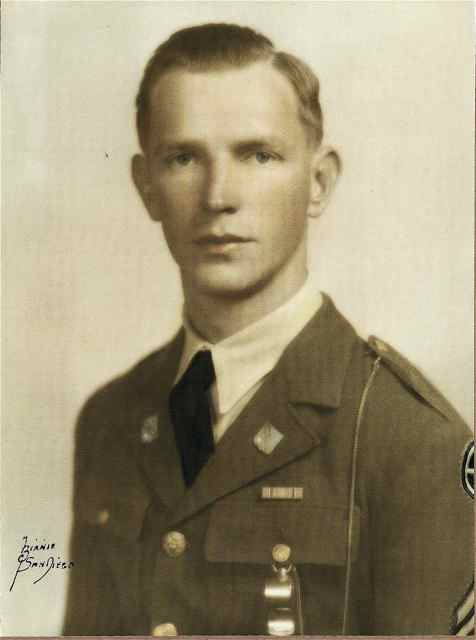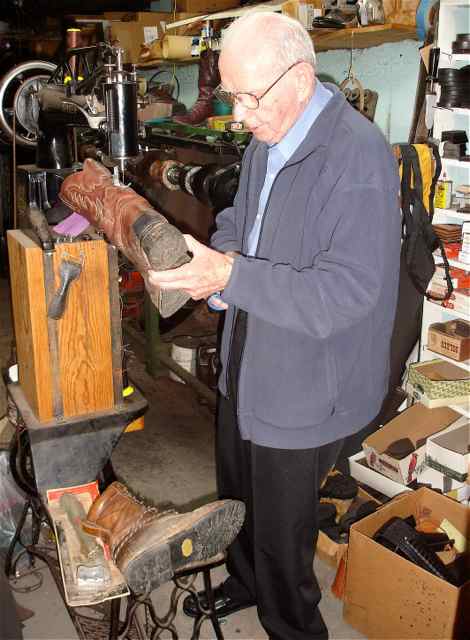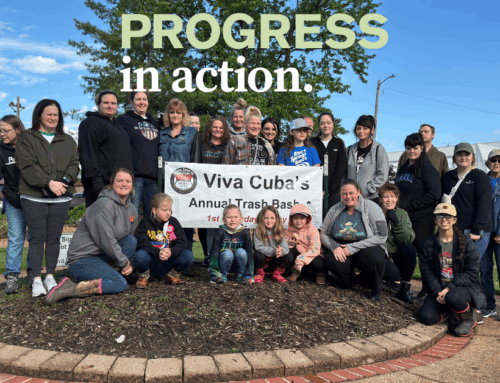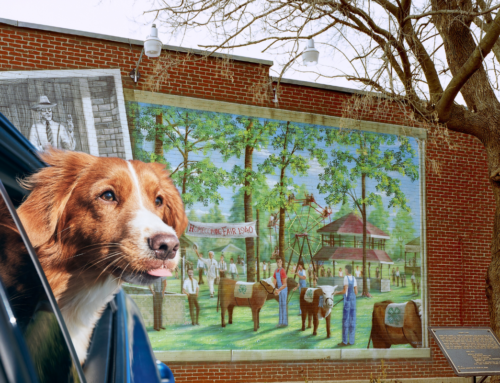This information is updated from a previous Cuba Free Press article.

As many young Americans of his his age did, Henry Hayes served his country before marrying and beginning a family.
March 31, 1918-February 27,2012 RIP
Cuba, Missouri: Henry Hayes, former owner of Hayes Shoe Store, was a cobbler, a businessman, a Baptist, a Lion’s Club member, a family man, a gentleman, and much more. He was known as a man of impeccable integrity, few words, and a sharp wit. For a few years,even after selling Hayes Shoe Store he went to his cobbler’s bench at the store each day because he had people who depended on the custom work that he did.
Hayes’ granddaughter Sarah Hayes created an album about her grandfather, especially his war years, for a school assignment. As Hayes’ granddaughter said in her album, “Henry is a tacit man who speaks only when he thinks what he has to say is completely essential.” In an earlier article for a school assignment that his grandson Jeff Branson wrote, he said of his grandfather, “Grandpa doesn’t talk much. When Grandpa talks, you know to listen carefully.”
Sarah’s album chronicled the life of a young Henry Hayes who grew up in West Plains and Rolla, wanted to have his own shoe store, and had met a girl named Audrey in 1940. World War II intervened, and Hayes had to defer his quest for his own shoe store and marriage to his sweetheart. Instead, he served in the army, fought in Germany, and carried Audrey’s picture in his pocket during his days in the foxholes of Europe.
Hayes started in the shoe business in fourth grade. He was able to convince Mr. Williams of Williams Shoe Store in Rolla to give him a job sweeping the repair shop there. He dreamed of having his own store. Hayes attended Rolla High School until 1937 and continued to work in the shoe business in West Plains, learning to be a cobbler. When he joined the West Plains unit of the Missouri National Guard in 1940, he never expected that he would be going to war or fighting battles.
The War Years
According to his granddaughter’s album, ‘ “I was serving in the 35th division of the National Guard at Camp Robinson in Little Rock, Arkansas, but the second I heard the news about Pearl Harbor being bombed, I knew that I was no longer a young boy trying to fulfill his required one year of National Guard service. No, with the impact of Pearl Harbor, I knew that the draft would call me, and I’d become a live and kicking soldier.”’ After training in the US, Hayes was sent to Europe. Hayes docked in Glasgow, Scotland.
From there he was shipped to Brest, France to fight his first battle as a member of the 2nd Division of the 140th Infantry. His unit fought the Germans for three weeks until the Germans finally surrendered. Hayes was stationed in the Black Forest in Germany. Every morning before battle he realized everything could end for him that day. He earned several Bronze Stars while fighting. He said that he hardly ever got to shower while in Germany and wondered what Audrey would think about that. He developed a habit of carrying different coins in his pocket from the countries he had been in, which would eventually lead to a coin collection, which reflected the events of his life.
While in Germany, Hayes saved several crisp American fifty-dollar bills. He had a plan for the money. The next time that he was near a mailbox, he intended to send Audrey the money to buy an engagement ring. She worked at a jewelry store in Springfield, and he thought that it would be easy for her to pick out a ring. Hayes intended to return home, marry Audrey, get his job back at a shoe store in West Plains, and someday have his own store.
Finally Hayes’ days as a squad leader ended, and he received his discharge papers in November. His discharge papers stated that he had fought in North France, the Rhineland, Ardennes, Normandy, and central Europe. Hayes, as would a generation of young Americans, would now return to the United States to start a new life.
Starting a business and a family
Hayes’ grandson Jeff Branson chronicled the next phase of Hayes’ life in a article “The Evolution of a Successful Business” for the 1995 edition of Cuba High School’s Backroads magazine.
In 1946, Hayes and Audrey were married, and they owned a shoe repair shop in West Plains, Missouri for three years before selling it and moving to Cuba in 1950. They started the store on West Main St. and moved to store’s present location on Route 66 in 1951. Hard work, determination, and the ability to work with the public would be the basis of a solid business.
Their daughter Ann was three when they moved to Cuba, and son David was born in Cuba. Church, family, community, and building their business would define their lives in the years ahead. Henry’s background in the shoe business and the classes the Hayes attended for shoe business owners contributed to their success. They made up for their shortage of operating capital with knowledge, a good work ethic, and customer service. According to the Backroads article, they would often cut costs by driving to St. Louis, buying what shoes they needed, then loading as many as they could into their car for a return to Cuba.
Hayes recollected to grandson Jeff the days when there wasn’t enough cash to keep the inventory they needed. He recalled a day when he couldn’t find a size that a customer needed, and he told the customer, ‘ “I hope some day we have enough shoes in this place that we will have to pick our way around stacks of shoes.” ’ Jeff remarked in the article that anyone that has ever been to a Hayes’ 99-cent shoe sale knows that those days finally arrived.
The shoe repair part of the business was always important to Henry. He could make shoes last longer or adapt them to the special needs of customers. Hayes liked this portion of the business because he could restore something that might have gone to waste, and he liked the challenge of repairing shoes that required a delicate touch not to ruin them, such as a high heel or removing old soles.
‘“Removing old soles isn’t always easy because they are stitched and cemented. The soles have to be carefully removed so the welt (or upper) is not damaged,”’ Hayes told Jeff. Hayes also had customers who depended on him to make orthopedic adjustments to their shoes because of various foot problems. It would cost the customer much more if they had to have the work done in St. Louis.
As the Hayes family grew, Audrey stayed home with the children for many years. When school started, she would work in the store until school was out and then she would go home with the children. According to Audrey, ‘ “If the children did have to spend time at the store, we tried to have some activity to keep them busy.” ’
According to grandson Jeff, their hideout was a small storage space under the stairs that served as a place to do homework and to play. Jeff mentioned that not only did David and Ann use this space but also the grandchildren when they visited. When granddaughter Sarah visited, Henry taught her, as he had his own children, to use a stick with a piece of gum on the end to retrieve coins that dropped into the floor grates of the store. Hayes continued his coin collection that started during WWII and shared his knowledge with his grandchildren.
Their children David and Ann also worked in the store as they were older and learned to respect the source of the family’s livelihood. In a Cuba Free Press article, David Hayes stated, ‘ “I’ve said publicly that I could write a book entitled Everything I needed to learn about management, I learned in the shoe store. There were invaluable lessons about how to meet the public, getting along with people, equanimity, business 101, and on and on. The lessons were truly endless.” ’
One story that Dr. David Hayes told when interviewed for a Cuba Free Press article illustrates how Henry and Audrey Hayes taught their children by example:
Hayes says that his parents also practiced what they preached, especially “give unto others.” He remembers vividly an example of this on a cold January or February night. A woman came into the shoe store just before closing with two kids. The mother needed shoes for the younger child and made it plain that she didn’t have a lot of money. “As mom fit the child, she noted during the fitting that the older boy had holes in the bottom of his shoes, and you could see his socks.” The boy’s mother said that she could only afford shoes for one. However, the Hayes fit both boys for shoes, for the price of one pair. Mr. Hayes said as they were leaving, “So are you going to the basketball game tonight, our boy is going?” The boy said he wanted go, but he didn’t have the 50 cents to go. Hayes says, “As they were leaving, Dad gave him a dollar and told him he better go to the basketball game. Again, they practiced what they preached …still do.”
Ann is now a speech pathologist in St. James, and David is a cardiologist at the Mayo Clinic in Rochester, Minnesota.
Hayes was a charter member of the Cuba Lions Club, and he and Audrey participated in club activities and donated the building for the current Lions Den. Hayes supported many civic improvements in Cuba, such as business development, the pool, and the fair. For years Hayes was an avid golfer and was known for his huge collection of old golf balls that he found on the course. Hayes always hated waste in any form.
Although they sold the shoe store to Jeff and Dona Bouse so that the business would have continuity, they both still worked in the store for many years. Audrey used her expertise in fitting shoes, and Hayes maintained his cobbler’s bench in the basement so that he could mend soles and make something old good again. He also passed on the basics of his mending to Jeff Bouse so that he could continue Henry’s work.
They continued their church and community work and were revered by their children, grandchildren, and those who know them. Henry still carried Audrey’s photo in his wallet, and she baked those sweets that he yearned for during the war years. They seemed to have done what eludes many modern families. They balanced all the important elements of what God gave them into a prosperous life. For Hayes, this was the life he was fighting for during the war, and he made the most of it. Hayes’ life illustrates the quote, “Give the world the best you have and the best will come back to you.”
After a few years of ill health, Henry passed on surrounded by friends and family and survived by his wife Audrey and his two children and their families.
The family has announced that there will be a memorial service for Mr. Hayes at a date to be announced.
Read Henry Hayes’ obituary here.
Read a past article “Cuba Lions honor Henry Hayes.”







